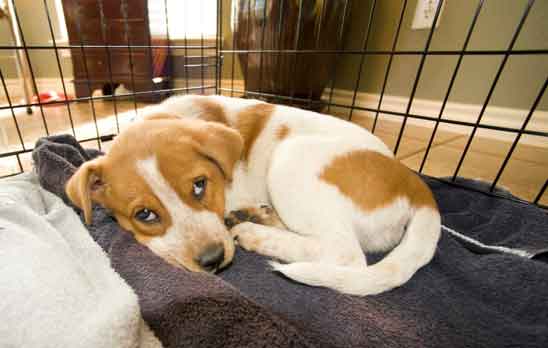
Having your dog confined to a crate following injury or surgery can seem like a nightmare. Here are Andrea McHugh's top tips to help you and your pet get through.
1. Safety First
Ask your vet for specific advice about crate rest, and how much movement your dog is allowed. Dogs on crate rest should normally be on leads at all times when taken outside for toileting, and may need to be carried down steps or helped back inside. Seek veterinary advice before commencing any of the activities in this feature to ensure that nothing will impede your dog's recovery.
2. Keep Calm
Create a peaceful environment so your dog doesn't become over-excited - particularly when you take him in and out of the crate. Keep your movements slow and your voice quiet, kneeling down to his level so that you don't encourage him to jump up. Playing soothing music during the day can help to relax him when you are not around.
3. Home From Home
Invest in the best quality crate that you can afford and position it in a draught-free spot where your dog can enjoy watching family activities. You could even place alternative crates in different rooms so that your dog experiences a change of environment throughout the day.
4. Softly, Softly…
Place a non-slip pad in the bottom of the crate and cover with soft, clean blankets. Wash, dry, and change these regularly and consider putting a blanket over the top of the crate for when you want to encourage your dog to sleep. A lot of physical and emotional healing occurs during sleep so his bed needs to be as comfortable as possible.
5. Puzzle Toys
Some dogs love playing with puzzle toys such as ones they have to touch with their nose to access a treat, or you can create your own scent games by hiding treats under a selection of upside-down pots and encouraging him to sniff out his prize. Make sure all games are calm and don't risk injury by allowing him to become over-excited.
6. Bowl Over
Help to alleviate boredom by scattering food inside the crate or feeding by hand. Ask your vet for specific dietary advice, as a dog on crate rest may not need as many calories as normal. Make sure that your dog always has easy access to fresh water, clipping water dishes on to the side of the crate so that they don't get knocked over.
7. Take A Trip
If your dog is used to travelling in the car in a crate or wearing a harness, and is guaranteed to remain calm then he may enjoy short car journeys. Going somewhere new and smelling different smells from an open window as he watches the world go by, followed by a quick on-lead toilet break and a steady journey home may help to lift his spirits. Ensure that your dog doesn't attempt to jump into the car though, encourage him to use a ramp or pick him up and gently place him inside.
8. Two's Company
Although crate rest may signal a temporary end to long walks and fun outdoor activities you can use this as an opportunity to really bond with your dog. Spend as much time together as possible, doing gentle grooming and massages to help pass the time and aid relaxation. Stroking your dog will be good for both of you, helping to lower blood pressure and reduce stress levels.
9. Chewing It Over
Offering your dog a toy that is filled with kibble or treats will help to keep him occupied. A Kong stuffed with a variety of tasty morsels such as peanut butter, cream cheese, or pieces of sausage will pass the time and encourage him to relax. Tying the Kong to a side of the crate can help to reduce your dog's body movement as he works out how to release the food.
10. Brain Games
Use some of your dog's daily food rations to use as rewards for teaching low-energy tricks to keep his brain active. Keep your voice and movements slow and use a clicker or verbal cue such as ‘yes' to teach fun activities such as guessing which hand a treat is in, touching your hand with his nose, crossing paws, turning his head to the left and right, toy discrimination, and picking up objects on command and dropping them into a box. Use your imagination and you will be amazed at what you can achieve.






